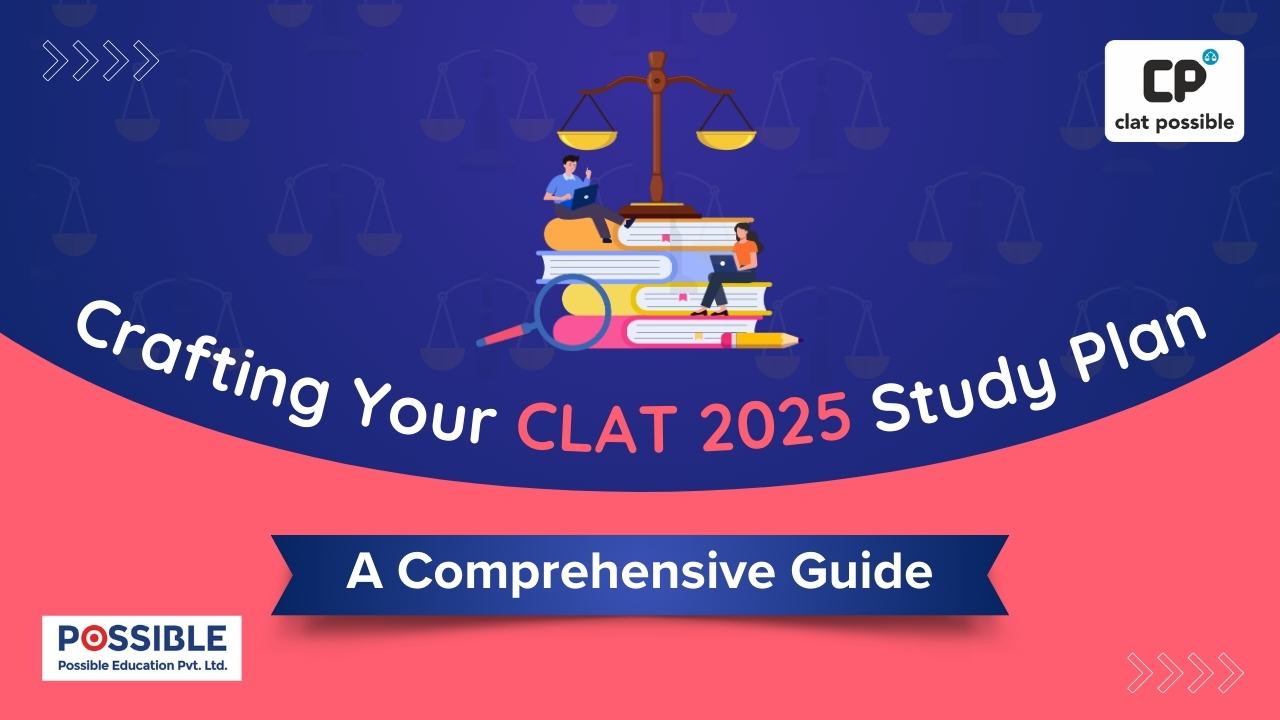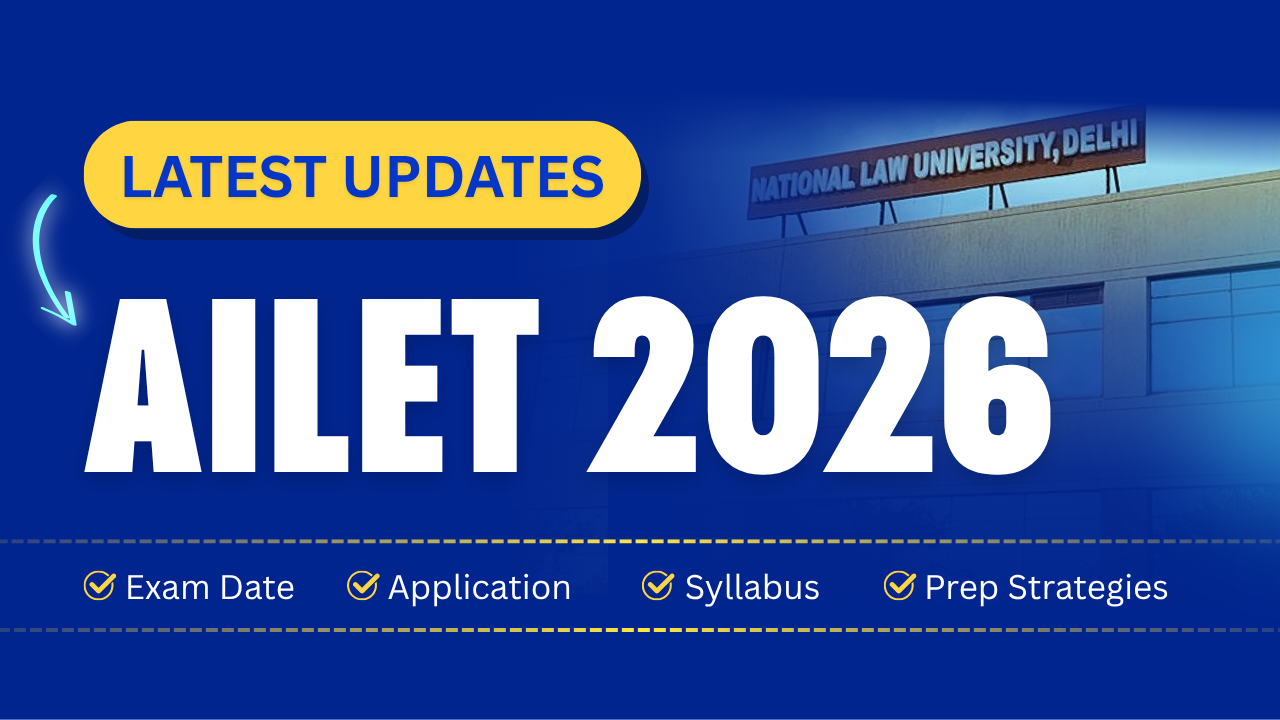By I May 18, 2024

The Common Law Admission Test (CLAT) is a critical step for aspiring law students in India. Given its competitive nature, it’s essential to start your preparation early and follow a meticulously structured study plan. This guide will help you craft a comprehensive study plan for CLAT 2025, ensuring you cover all necessary topics efficiently. Additionally, we'll address some frequently asked questions to help clarify common concerns.
Understanding the CLAT Exam Structure
Before diving into the preparation strategy, it's crucial to understand the exam format.
- Exam Sections: CLAT consists of five sections:
- English Language: Focuses on comprehension, grammar, and vocabulary.
- Current Affairs including General Knowledge: Covers recent events, history, geography, general science, economics, and civics.
- Legal Reasoning: Tests your understanding of legal principles and their application.
- Logical Reasoning: Involves critical thinking, logical sequences, and arguments.
- Quantitative Techniques: Basic mathematical ability, primarily class 10th level.
- Exam Duration: The exam is 120 minutes long.
- Question Format: Primarily multiple-choice questions (MCQs) with one mark for each correct answer and a negative marking of 0.25 for each incorrect answer.
Step-by-Step Guide to Craft Your CLAT 2025 Study Plan
1. Assess Your Current Knowledge
- Diagnostic Test: Start by taking a diagnostic test to evaluate your current level in each section. This will help you identify your strengths and areas that need improvement.
- Self-Assessment: Reflect on your previous academic performance and your comfort level with each subject area.
2. Set Clear Goals
- Define Your Targets: Set specific, measurable, achievable, relevant, and time-bound (SMART) goals for your CLAT preparation.
- Daily and Weekly Goals: Break down your targets into manageable daily and weekly goals to ensure consistent progress.
3. Create a Study Schedule
- Daily Study Plan: Allocate specific time slots for each subject. Ensure a balanced approach, giving more time to weaker areas.
- Weekly Review Sessions: Dedicate time each week to review what you've studied. This helps reinforce your learning and identify areas needing revision.
- Mock Tests and Practice Papers: Integrate regular mock tests into your schedule. They help simulate exam conditions and improve time management.
4. Focus on Each Section
- English Language:
-
- Reading Comprehension: Practice reading diverse materials like newspapers, novels, and journals.
- Vocabulary: Use flashcards, word lists, and vocabulary apps to enhance your word power.
- Grammar: Review basic grammar rules and practice through exercises and quizzes.
- Current Affairs and General Knowledge:
-
- Daily News: Read newspapers and follow reliable news sources daily.
- Monthly Magazines: Subscribe to current affairs magazines.
- Static GK: Study history, geography, and general science from standard books.
- Legal Reasoning:
-
- Principles and Concepts: Understand basic legal principles and their applications.
- Case Laws: Familiarize yourself with landmark judgments and legal terms.
- Practice: Solve previous years’ question papers and mock tests.
- Logical Reasoning:
-
- Critical Thinking: Engage in puzzles, brainteasers, and logical games.
- Practice Questions: Regularly solve logical reasoning questions to improve speed and accuracy.
- Quantitative Techniques:
-
- Basic Mathematics: Strengthen your fundamentals in arithmetic, algebra, and geometry.
- Practice: Solve quantitative aptitude questions from various sources.
5. Regular Revision
- Revision Plan: Have a dedicated revision plan. Regularly revisit topics to ensure retention.
- Notes and Summaries: Create concise notes and summaries for quick revisions.
6. Stay Healthy and Positive
- Healthy Lifestyle: Maintain a balanced diet, get adequate sleep, and exercise regularly.
- Mental Health: Practice mindfulness, meditation, or yoga to reduce stress and stay focused.
Frequently Asked Questions (FAQs)
1. How many hours should I study daily for CLAT 2025?
- It's recommended to study for 4-6 hours daily, but the key is consistency and focused study. Quality matters more than quantity.
2. When should I start preparing for CLAT 2025?
- Starting your preparation at least a year in advance is ideal. This gives you ample time to cover all topics and revise thoroughly.
3. How important are mock tests in CLAT preparation?
- Mock tests are crucial as they simulate the actual exam environment, help you manage time effectively, and identify your strengths and weaknesses.
4. What are some good resources for CLAT preparation?
- Books: Universal's CLAT Guide, Pearson’s Guide to the CLAT, and books by R.S. Aggarwal for quantitative and logical reasoning.
- Online Platforms: Websites like CLATapult, Career Launcher, and TestFunda offer excellent resources and practice tests.
- Newspapers: The Hindu, The Indian Express for current affairs and reading comprehension practice.
5. How do I stay motivated during my preparation?
- Set short-term goals and reward yourself for achieving them.
- Join study groups or online forums to stay connected with fellow aspirants.
- Keep reminding yourself of your ultimate goal and visualize your success.
Conclusion
Crafting a well-structured study plan is the first step towards acing CLAT 2025. By understanding the exam pattern, setting clear goals, and following a disciplined study routine, you can enhance your chances of success. Remember, consistency and perseverance are key. Stay focused, practice regularly, and take care of your mental and physical health. Good luck!
For more informative blogs on CLAT 2025 preparation, Click Here!!



